Barriers of listening skills pdf
1. done, it should be a relatively straightforward process.. Barriers to listening A pointed out earlier, listening is not easy and there are a number of obstacles that stand in the way of effective listening, both within outside the workplace.
is the study that systematically manipulates listening skills and tests their impact on relevant outcomes (c.f. Hutchby, 2005; Libow & Doty, 1976). Similarly, barriers to listening are identified in all major listening texts. Unfortunately, only a handful of studies have systematically tested these barriers. Moreover, many of these studies use preformulated lists derived from textbooks (e.g
PDF On Mar 16, 2018, Radhika Kapur and others published Barriers to Effective Communication individuals should possess efficient speaking and listening skills, they should make . sure that
Core Listening Skills – How to be a better listener. (SucceedSocially.com) (SucceedSocially.com) Effective Communication (PDF) – How to communicate in groups using nonverbal communication and active listening techniques.
The top 3 barriers to effective listening are distractions, misinterpretations and attachment to personal beliefs and values. These barriers can prevent you from …
The key to effective listening and interpersonal skills more generally is the ability to have a truly open mind – to understand why others think about things differently to you and use this information to gain a better understanding of the speaker.
BARRIER OF LISTENING SKILLS 1. A P R E S E N T A T I O N O N : 2. • Physical Barriers • People – Related Barriers • Physiological Barriers • Psychological Barriers 9/27/2016 6:59:43 AM 2
Types and barriers to listening 1. TYPES AND BARRIERS TO LISTENING 2. Listening : Listening is a process of Receiving, Interpreting and reacting to a message received from the Speaker.
In this unit we will investigate effective listening skills, barriers to effective listening, and methods of improving our own listening skills. 1 Lack of Interest Lack of interest in the speaker’s topic does create a difficult situation.or even mentally composing a response to what is being said -.
and the essential skill of listening to others, before discussing barriers to communication, and how to improve communication. The book focuses on interpersonal spoken or non-verbal communication, including body language,
an emphasis on speaking and listening skills from an early age a rigorous, sequential approach to developing speaking and listening and teaching reading, writing and spelling through systematic phonics
Poor Listening Skills Listening to others is considered a difficult task. A typical speaker says about 125 words per minute. The typical listener can receive 400–600 words per minute. Thus, about three-fourth of listening time is free time. The free time often sidetracks the listener. The solution is to be an active rather than passive listener. A listener’s premature frown, shaking of the
Overcoming Listening Barriers lynda.com
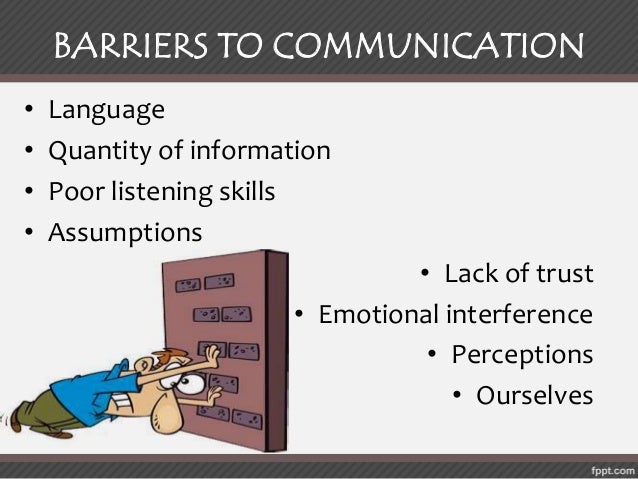
Barriers to Listening An Analysis of Its Importance in
A Paper on Listening Skills In today’s life we find it a bit difficult to make important decisions or to perform the tasks in a shorter span of time because we are used to taking our time in analyzing and understand the situation and then acting on it.
The factors which act as impediments to effective listening and are considered as barriers to effective listening can be classified into the following: Physical Barriers Noise, poor acoustics, malfunctioning of the mechanical devices being used, frequent interruptions and uncomfortable seating arrangements are physical barriers that hamper effective listening .
Barriers to Acquiring Listening Strategies for EFL Learners and Their Pedagogical Implications March 2005 — Volume 8, Number 4 Barriers to Acquiring Listening Strategies for EFL Learners and Their Pedagogical
C. Listening skills Difference between listening and leaving. Types of listening Why you need good listening skills Good listening practices. D. Providing feedback Giving feedback Characteristics of good feedback Activity E. Non-verbal communication Types Functions Characteristics Activity F. Giving and receiving instructions Give clear instructions Use a structured approach Receive and
BARRIERS TO EFFECTIVE LISTENING In the initial phase of study of customer service operations, Fleming Communications, Inc., determined that listening is the communication task that our
Abstract. This paper explores what listening skills are then presents a published article on the results of a study conducted at a college on student barriers to listening.
Of all the communication skills we use regularly, listening ranks at the top in importance. And yet, somehow, in the rush to speak and argue for action, listening has gotten lost and its
approach of prescribing that educators do more to rectify students’ skills deficiencies overlooks barriers which prevent greater incorporation of listening instruction in the accounting curriculum. An alternative integrated stakeholder approach to develop students’ listening skills is proposed. Informed by a broad range of education literature, the approach identifies cross-disciplinary
The fifth article in our six-part series on communication skills explores how nurses can improve their listening and information-gathering skills. It looks at how patients’ recall of information can be improved, enhancing effective communication.
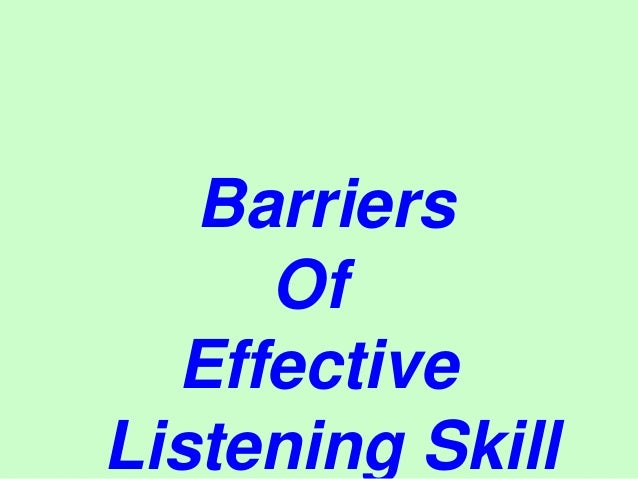
Good listening skills also have benefits in our personal lives, including: a greater number of friends and social networks, improved self -esteem and confidence, …
Barriers to Effective Listening in Groups Hearing vs. Listening: Importance of Listening Skills for Speakers
Listening Skills Training have recognised and understood the barriers to listening ♦ be aware of their own prejudices and how to manage them ♦ have understood and accept the barriers to offering emotional support, such as self‐ disclosure and offering advice
of Effective Listening Skills. The three modes, or manners, of listening are Attentive, Responsive, and Active. The four levels of listening are Factual, Perceptive, Emotional, and Mixed. We’ll highlight each area to help increase your listening accuracy and reduce the opportunity for misunderstanding. Developing Effective Listening Skills 3 Most people do not listen with the intent to
Active Listening Skills •How do such barriers impact on the conversation between the service user and the staff member? Barriers to effective communication Barriers include: •Failure to properly listen to the persons concerns •Being in a hurry, multi-tasking and/or not paying attention •Pre-conceived ideas about the person or situation •Becoming defensive when the service user is
BARRIERS 2 to Effective Listening A child may have difficulties with one or more of the following: 1. Auditory memory 2. Auditory processing 3 L hi 3. Language comprehension 4. Concentration 5. Motivation 6. Hearing (permanently or intermittently) These barriers to listening may be experienced by pupils with: 9Dyslexia 9Dyspraxia, including Verbal Dyspraxia 9Auditory Processing Disorder (APD
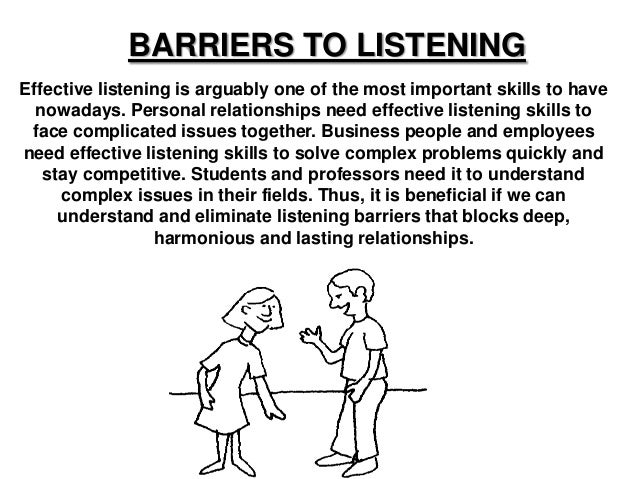
to develop active listening skills. Resources ‘Barriers to listening’ factsheet example ‘internal dialogue’ slide. Use this session as a starter to ‘Developing listening skills’. Activity 1. Ask the students to sit for one minute in silence. Then ask them to tell the person next to them as many thoughts as they can remember from that one minute. This is our internal dialogue
Removing barriers to literacy-FINAL-14FEB11
– pathways 3 listening speaking and critical thinking pdf
Barriers to Effective Listening 2012 Book Archive
to Effective Listening Learning Works
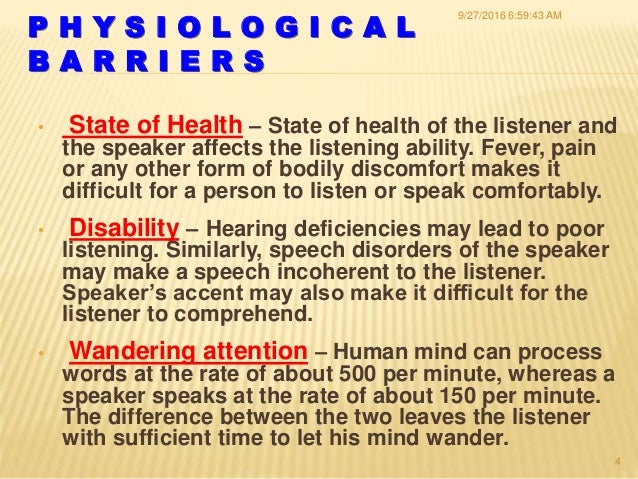
BARRIER OF LISTENING SKILLS SlideShare
Barriers to Listening Public Speaking Conversation
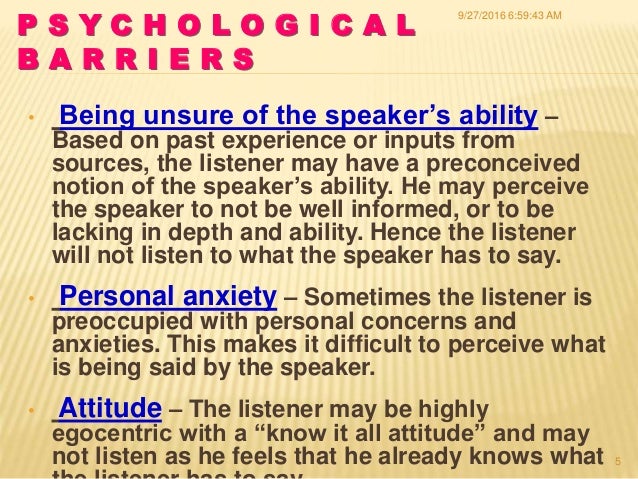
Listening Skills Catholic Resources
14258601 Barriers to Listening Accent (Sociolinguistics


–


BARRIERS TO LISTENING Samaritans
Barriers to Acquiring Listening Strategies for EFL
Abstract. This paper explores what listening skills are then presents a published article on the results of a study conducted at a college on student barriers to listening.
In this unit we will investigate effective listening skills, barriers to effective listening, and methods of improving our own listening skills. 1 Lack of Interest Lack of interest in the speaker’s topic does create a difficult situation.or even mentally composing a response to what is being said -.
to develop active listening skills. Resources ‘Barriers to listening’ factsheet example ‘internal dialogue’ slide. Use this session as a starter to ‘Developing listening skills’. Activity 1. Ask the students to sit for one minute in silence. Then ask them to tell the person next to them as many thoughts as they can remember from that one minute. This is our internal dialogue
Of all the communication skills we use regularly, listening ranks at the top in importance. And yet, somehow, in the rush to speak and argue for action, listening has gotten lost and its
Barriers to Acquiring Listening Strategies for EFL Learners and Their Pedagogical Implications March 2005 — Volume 8, Number 4 Barriers to Acquiring Listening Strategies for EFL Learners and Their Pedagogical
PDF On Mar 16, 2018, Radhika Kapur and others published Barriers to Effective Communication individuals should possess efficient speaking and listening skills, they should make . sure that
Barriers to Listening Public Speaking Conversation
Overcoming Listening Barriers lynda.com
BARRIERS TO EFFECTIVE LISTENING In the initial phase of study of customer service operations, Fleming Communications, Inc., determined that listening is the communication task that our
The fifth article in our six-part series on communication skills explores how nurses can improve their listening and information-gathering skills. It looks at how patients’ recall of information can be improved, enhancing effective communication.
Barriers to Effective Listening in Groups Hearing vs. Listening: Importance of Listening Skills for Speakers
and the essential skill of listening to others, before discussing barriers to communication, and how to improve communication. The book focuses on interpersonal spoken or non-verbal communication, including body language,
Abstract. This paper explores what listening skills are then presents a published article on the results of a study conducted at a college on student barriers to listening.
The top 3 barriers to effective listening are distractions, misinterpretations and attachment to personal beliefs and values. These barriers can prevent you from …
Effective listening and observation skills nursingtimes.net
14258601 Barriers to Listening Accent (Sociolinguistics
Active Listening Skills •How do such barriers impact on the conversation between the service user and the staff member? Barriers to effective communication Barriers include: •Failure to properly listen to the persons concerns •Being in a hurry, multi-tasking and/or not paying attention •Pre-conceived ideas about the person or situation •Becoming defensive when the service user is
an emphasis on speaking and listening skills from an early age a rigorous, sequential approach to developing speaking and listening and teaching reading, writing and spelling through systematic phonics
Core Listening Skills – How to be a better listener. (SucceedSocially.com) (SucceedSocially.com) Effective Communication (PDF) – How to communicate in groups using nonverbal communication and active listening techniques.
PDF On Mar 16, 2018, Radhika Kapur and others published Barriers to Effective Communication individuals should possess efficient speaking and listening skills, they should make . sure that
Abstract. This paper explores what listening skills are then presents a published article on the results of a study conducted at a college on student barriers to listening.
Poor Listening Skills Listening to others is considered a difficult task. A typical speaker says about 125 words per minute. The typical listener can receive 400–600 words per minute. Thus, about three-fourth of listening time is free time. The free time often sidetracks the listener. The solution is to be an active rather than passive listener. A listener’s premature frown, shaking of the
is the study that systematically manipulates listening skills and tests their impact on relevant outcomes (c.f. Hutchby, 2005; Libow & Doty, 1976). Similarly, barriers to listening are identified in all major listening texts. Unfortunately, only a handful of studies have systematically tested these barriers. Moreover, many of these studies use preformulated lists derived from textbooks (e.g
approach of prescribing that educators do more to rectify students’ skills deficiencies overlooks barriers which prevent greater incorporation of listening instruction in the accounting curriculum. An alternative integrated stakeholder approach to develop students’ listening skills is proposed. Informed by a broad range of education literature, the approach identifies cross-disciplinary
BARRIER OF LISTENING SKILLS 1. A P R E S E N T A T I O N O N : 2. • Physical Barriers • People – Related Barriers • Physiological Barriers • Psychological Barriers 9/27/2016 6:59:43 AM 2
A Paper on Listening Skills In today’s life we find it a bit difficult to make important decisions or to perform the tasks in a shorter span of time because we are used to taking our time in analyzing and understand the situation and then acting on it.
Removing barriers to literacy-FINAL-14FEB11
Barriers to Acquiring Listening Strategies for EFL
BARRIER OF LISTENING SKILLS 1. A P R E S E N T A T I O N O N : 2. • Physical Barriers • People – Related Barriers • Physiological Barriers • Psychological Barriers 9/27/2016 6:59:43 AM 2
Core Listening Skills – How to be a better listener. (SucceedSocially.com) (SucceedSocially.com) Effective Communication (PDF) – How to communicate in groups using nonverbal communication and active listening techniques.
BARRIERS TO EFFECTIVE LISTENING In the initial phase of study of customer service operations, Fleming Communications, Inc., determined that listening is the communication task that our
Barriers to Acquiring Listening Strategies for EFL Learners and Their Pedagogical Implications March 2005 — Volume 8, Number 4 Barriers to Acquiring Listening Strategies for EFL Learners and Their Pedagogical